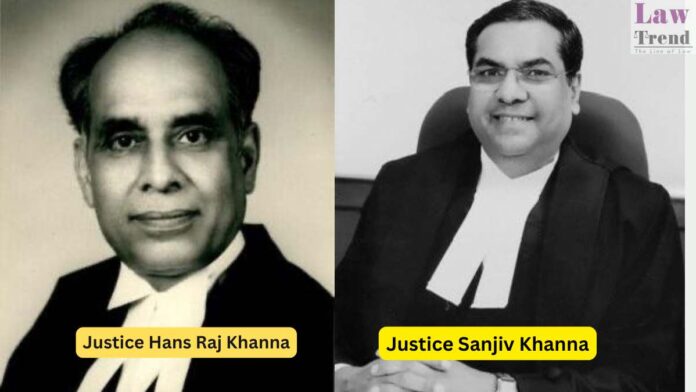Justice Sanjiv Khanna is set to become the 51st Chief Justice of India (CJI), a landmark moment that brings to light a historical connection with one of India’s most significant judicial episodes. His elevation as CJI not only carries personal significance but also echoes a momentous decision made by his uncle, Justice Hans Raj Khanna, whose dissent in the infamous 1976 Habeas Corpus Case redefined the idea of personal liberty and judicial integrity in India.
Justice Sanjiv Khanna’s family has a strong judicial legacy. His father, Dev Raj Khanna, served as a judge in the Delhi High Court, while his uncle, Hans Raj Khanna, was a Supreme Court judge who made one of the most courageous dissenting judgments in India’s legal history. This article delves into the complex legacy of Justice Hans Raj Khanna and the impact of the Habeas Corpus Case that cost him the position of Chief Justice of India.
The 1976 Emergency and ADM Jabalpur vs. Shivkant Shukla (Habeas Corpus Case)
In June 1975, Prime Minister Indira Gandhi imposed a state of Emergency in India, citing internal disturbances. This period lasted for 21 months and saw the suspension of civil liberties, mass arrests, and strict press censorship. Thousands were detained under the Maintenance of Internal Security Act (MISA), which allowed preventive detention without trial.
The Habeas Corpus Case, officially known as ADM Jabalpur vs. Shivkant Shukla, 1976, became a watershed moment in Indian constitutional law. It revolved around the central question: can citizens seek judicial review and enforcement of their fundamental rights during an Emergency?
During the Emergency, Article 359(1) of the Constitution was invoked, suspending citizens’ right to approach courts for the enforcement of fundamental rights, including the crucial Article 21, which ensures protection against unlawful detention. High Courts across India, however, began releasing detainees through writ petitions, causing the government to approach the Supreme Court to establish a uniform decision.
The Constitutional Battle: Fundamental Rights vs. State Power
The government argued that, under Emergency, it could suspend all fundamental rights, including the right to life and personal liberty (Article 21). This argument meant that the state could not only detain individuals without trial but also prevent them from seeking legal recourse. The question was whether the judiciary would permit such sweeping state powers.
A five-judge bench of the Supreme Court presided over the case, with immense pressure from the ruling government to rule in its favor. Four out of the five judges ultimately ruled that the government had the authority to suspend fundamental rights during an Emergency, making it clear that citizens could not approach courts for relief.
However, Justice Hans Raj Khanna was the sole dissenter in the judgment. He argued that even during an Emergency, the right to life and personal liberty is inalienable. His dissent emphasized that arbitrary state action must be checked and that courts should remain guardians of citizens’ rights. In his judgment, he stated, “Detention without trial is an anathema to all those who love personal liberty.”
The Cost of a Dissent: HR Khanna’s Sacrifice
Justice Khanna’s dissent was expected to have serious repercussions. Before delivering his judgment, he wrote to his sister: “I have prepared my judgment, which is going to cost me the Chief Justice-ship of India.” His prediction came true. Instead of Justice Khanna, the junior judge on the bench, Justice M.H. Beg, who had sided with the government, was appointed CJI. In his ruling, Beg had even praised the government’s treatment of detainees, comparing it to that of a “mother caring for its children.” In protest, Justice Khanna resigned.
The decision to bypass Justice Khanna, despite his seniority, marked a turning point in Indian judicial history, highlighting the political pressures on the judiciary during the Emergency. Despite being eligible for the top judicial position, Justice Khanna’s principled stance cost him the CJI role—a position he truly deserved.
HR Khanna’s Legacy and Recognition
Following the end of the Emergency in 1977, the newly elected Janata Party government requested Justice Khanna to lead an inquiry into the excesses of the Emergency, but he refused, citing potential bias. He believed in maintaining impartiality, despite the opportunity to “settle scores” with the previous regime. He later served as the Chairman of the Law Commission of India, focusing on legal reforms rather than personal vindication.
Justice Khanna’s dissent has been widely recognized as a moral victory. Eminent jurists like Nani Palkhivala and other legal luminaries hailed his courage and integrity. He became the first sitting Supreme Court judge to have his portrait unveiled in the court during his lifetime—a rare honor in Indian legal circles.
Justice P.N. Bhagwati, who had sided with the government in the Habeas Corpus Case, later expressed regret for his judgment, acknowledging the immense pressure during the Emergency. Similarly, Justice Y.V. Chandrachud, who was part of the majority judgment, had his decision overturned by his own son, Justice D.Y. Chandrachud, in the landmark Puttaswamy vs. Union of India case in 2017, which restored personal liberty and privacy as fundamental rights, explicitly overruling the 1976 decision.
A Course Correction: Sanjiv Khanna’s Elevation as CJI
Nearly five decades later, the judicial baton passes to Justice Sanjiv Khanna, bringing a sense of closure to his family’s judicial legacy. In many ways, his appointment as the 51st Chief Justice of India can be seen as a symbolic course correction. Justice Khanna’s rise to the top judicial position comes at a time when the judiciary has reaffirmed its role as the guardian of fundamental rights, with recent verdicts like Puttaswamy reinstating the significance of individual liberties over state power.
The legacy of Justice Hans Raj Khanna stands tall in India’s judicial history, with his nephew now set to take over the country’s highest judicial office. Sanjiv Khanna’s tenure as CJI signifies not just the continuity of a remarkable family tradition but also a triumph of constitutional values over political expediency—a legacy of justice that could not be suppressed, even in the darkest times.




